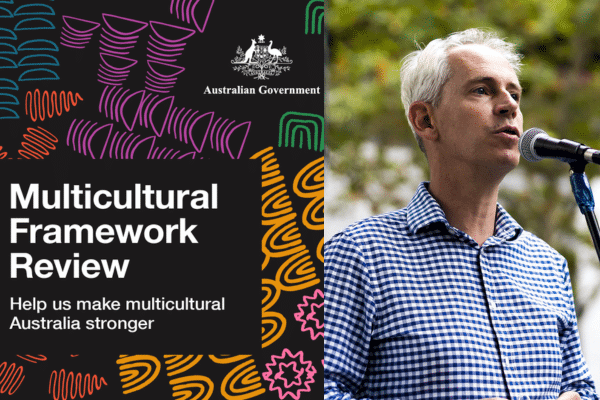The Federal Government is calling on Australia’s Culturally and Linguistically Diverse (CALD) communities to share their perspectives on multiculturalism for the Federal Government’s Multicultural Framework Review, currently open for submissions.
Speaking at a press conference in Melbourne on Tuesday, Minister for Immigration, Citizenship and Multicultural Affairs Andrew Giles formally launched the review’s public submissions process, which has been open since July.
The review aims to reassess Commonwealth policy and restructure the national approach to multiculturalism. It coincides with the 50th anniversary of the Whitlam Government’s 1973 report, ‘A Multi-cultural Society for the Future’, a key blueprint for contemporary multicultural Australia.
“Multiculturalism has been instrumental to Australia’s success over the last 50 years and will continue to be one of the key forces shaping our nation. We must ensure that we have the right policies and institutions to meet the needs of our increasingly diverse society,” Minister Giles said.
Earlier this year, the Government faced significant backlash from CALD communities for not raising awareness of the Multicultural Framework Review when it was initiated in February, with concerns multicultural Australians would miss out on the chance to give meaningful input.
Timestamp was 8.40pm when we wrapped up our first #multicultural framework review session held with members of the African Australian community. Another 4 more sessions to go! #auspol @andrewjgiles #community pic.twitter.com/xiWSqlJG0n
— alliesincolour (@alliesincolour) March 6, 2023
In a historical first, the Department of Home Affairs will accept submissions in languages other than English and have made information on the review available in 35 key languages. Following criticism for previously distributing review information only in English, Minister Giles describes this move as the Government ‘recognising the importance of speaking to people on terms that work for them.’
“We want to hear from a range of voices sharing their lived experiences, their views on what is working well and what could be improved to advance our multicultural nation. The Government has prioritised accessibility to a variety of languages and cultural groups so that everyone, no matter what language they speak, can have their say,” he said.
Alongside written submissions, the review is also accepting video and audio recorded entries to encourage newly arrived migrants and youth to share their perspectives.
“One thing that that’s come across consistently in the initial work we’ve done on the review is that many younger people from newly arrived communities prefer to communicate in formats other than the written word,” said Minister Giles.
“We’ve responded to that feedback and made it possible for people to engage with the review process by sending in a short video or something similar rather than putting finger to keyboard or pen to paper.”
The review is open to submissions via an online form until 29 September and invites Australians to consider broadly how policy in any area can better meet the needs of the CALD community. Minister Giles says the decision to implement an open-ended form will help the review better understand community needs.
“What we’re hoping to do by opening up feedback as widely as possible is to identify the questions that we are not asking, to identify those gaps in government’s engagement with community that perhaps are not visible to those of us who deal formally in policymaking,” he said.
“[This will] help us realise the country we might be if we fill in those gaps to ensure that everyone in this country, regardless of their background, can feel proud of who they are.”
READ ALSO: Dutton may win the battle but lose the war: The Voice
Minister Giles has committed to engaging ‘on the ground’ with CALD communities in ‘every State and Territory’ over the coming weeks, to encourage conversation and support for not only the review, but the upcoming Voice referendum.
“I’ll be doing events in the coming weeks to engage with communities on their terms and to hopefully play a part in creating an environment that is about listening,” he said.
“The Framework Review is about listening…through listening to different perspectives, we get better policy outcomes. For me, that’s also exactly what the Voice is about. I think when discussed in those terms, we will see broad support for the Voice across the Australian community, particularly through migrant communities.”
Hass Dellal AO, former director of SBS is leading the review panel, alongside eminent human rights lawyer Nyadol Nyuon OAM, and CEO of Multicultural Australia Ms Christine Castley.
A reference group, which includes Centre for Australia India Relations Chair Swati Dave has also been formed to support the panel in reviewing the submissions.
Submissions made by the public will be considered by the panel and go towards collating a Multicultural Framework report to be presented to government early next year.
Visit the Multicultural Framework Review website to find resources in your language and make a submission.
READ ALSO: Explaining the Voice referendum





